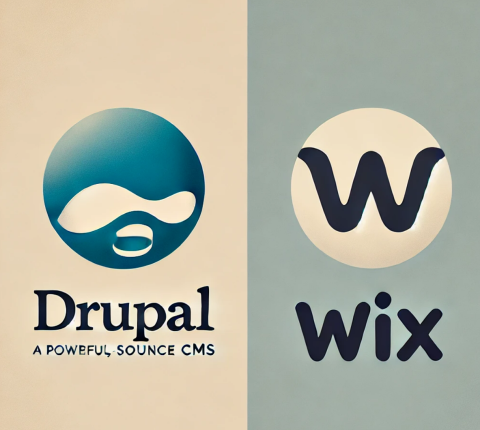Drupal and Wix, why we choose Drupal?

When it comes to building a website, choosing the right platform can make all the difference, and two names that often come up are Drupal and Wix. Both serve the same fundamental purpose—helping you create a website—but they cater to very different audiences and needs.
Drupal is a powerhouse in the world of content management systems. It’s open-source, highly customizable, and built for those who want complete control over their website. Whether you’re a developer or part of a team working on a complex project, Drupal offers flexibility that’s hard to match. You can create intricate workflows, custom entities, and unique designs. However, all this power comes at a price: it requires a good deal of technical know-how. If you’re not comfortable with coding or don’t have a developer on hand, Drupal’s learning curve can be daunting.
On the other hand, Wix is the epitome of simplicity. It’s designed for people who want to build a website quickly without diving into code. Its drag-and-drop builder and pre-designed templates make it incredibly user-friendly, even for complete beginners. However, this simplicity has its limits. Wix is great for small, straightforward websites, but when it comes to complex features or scaling up, you might find its customization options restrictive.
Cost is another area where the two differ significantly. Drupal is free to download and use, but you’ll need to pay for hosting, domain registration, and potentially for a developer. In contrast, Wix operates on a subscription model, making it easier to predict costs upfront, though those costs can add up with premium plans and add-ons.
When it comes to SEO, both platforms have their strengths, but Drupal takes the lead for those who want advanced control. With modules like Metatag and Yoast, you can fine-tune every aspect of your site’s SEO strategy. Wix, while perfectly adequate for most small businesses, can feel limiting if you’re aiming for a highly optimized site.
Ultimately, the choice between Drupal and Wix boils down to your needs and skills. If you’re building a large, scalable, and feature-rich website and have the technical expertise (or a budget for developers), Drupal is the way to go. But if you’re a solo entrepreneur or small business owner looking for a quick, hassle-free way to get online, Wix might be the perfect fit. It’s not just about what’s “better”—it’s about what works best for you.
But why we choose Drupal finally, the following reasons you need to consider,
1. Data Ownership
- Drupal:
- Full control over your data. You host your website on a server of your choice, whether it's a shared host, VPS, or dedicated server.
- You can back up, export, and move your data anytime, without restrictions.
- Your data is as secure as the measures you implement on your hosting (e.g., server-side encryption, secure backups).
- Wix:
- Your data resides on Wix’s servers. While they manage security, you don’t have complete control over your data.
- Limited options for exporting your site. If you want to migrate, you may need to rebuild your site on another platform.
- Bound by Wix’s policies and infrastructure.
2. Data Security
- Drupal:
- Security depends on your hosting provider and how you configure your website. For example:
- Use HTTPS with a valid SSL certificate.
- Keep Drupal core and modules up to date.
- Implement robust user authentication and access controls.
- The Drupal Security Team provides timely updates and patches for vulnerabilities.
- You are responsible for ensuring compliance with data protection regulations like GDPR or HIPAA.
- Security depends on your hosting provider and how you configure your website. For example:
- Wix:
- Handles security for you, including HTTPS encryption, firewall protection, and DDoS mitigation.
- Security is built into the platform, but it’s a shared responsibility. For example, if Wix is compromised, your data might be at risk.
- Limited ability to customize security measures compared to self-hosted platforms like Drupal.
3. Privacy and Regulations
- Drupal:
- Allows complete control over privacy settings, data storage, and user permissions.
- You can configure your site to comply with regional regulations like GDPR (data location, user consent management, etc.).
- Freedom to host data in countries with specific privacy laws.
- Wix:
- While Wix is compliant with GDPR and other standards, your data storage location is controlled by Wix.
- Not suitable for businesses or organizations with strict data sovereignty requirements.
4. Reliability
- Drupal:
- Your site’s reliability depends on your hosting provider and the technical setup.
- Full control means you can implement redundant systems, backups, and failover mechanisms.
- Wix:
- Highly reliable infrastructure managed by Wix, including automated backups and a global content delivery network (CDN).
- Dependence on Wix’s uptime and business continuity.
Conclusion:
If data safety and ownership are key priorities, Drupal is the clear winner. With Drupal:
- You own and control your data completely.
- You can configure robust security measures tailored to your needs.
- You can ensure compliance with data protection regulations specific to your region or industry.
Wix, while easier to use and secure by default, does not provide the same level of control or data sovereignty. It’s a good choice for those who prioritize simplicity over control.
Let me know if you'd like advice on securing a Drupal site or migrating data!